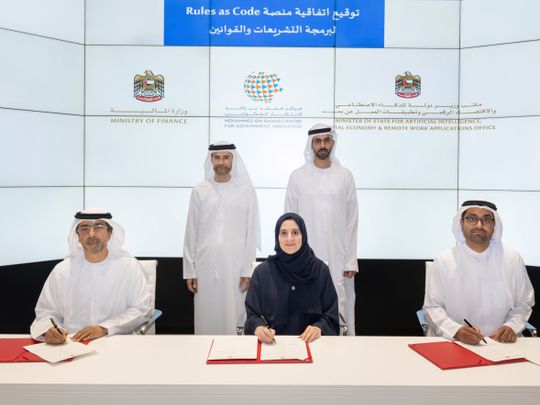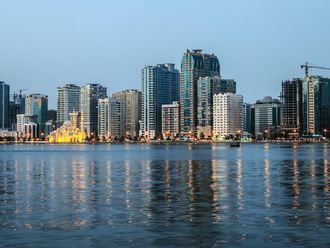
Dubai: The Ministry of Finance (MoF), in collaboration with the Artificial Intelligence, Digital Economy, and Remote Work Applications Office and the Mohammed Bin Rashid Centre for Government Innovation (MBRCGI), is launching a platform to develop financial legislation and policies using digital solutions.
The “Rules as Code” platform builds a comprehensive digital infrastructure for the creation of AI-based laws and regulations. It aims to improve the legislative environment through digital solutions and coding, facilitating the development of financial laws, regulations, and policies.
“Transformational innovations help promote wellbeing at a time when disruptive technology is making exceptional leaps that change life and work patterns. This is all happening amid the emergence of new economic and business models shaped by the latest technology,” said Mohamed bin Hadi Al Hussaini, Minister of State for Financial Affairs. “Data transparency is gaining great importance in the government’s ecosystems as well as in the Ministry of Finance’s work.”
“The platform being developed will provide community members with a better understanding of laws, legislation and financial policies so they can utilize them in their personal and professional lives.”
The approach involves creating rules in government that are better suited for digital service delivery, creating software tools to write the rules into code, and then using that code as a basis for service delivery and decisions.
Coded rules can automate certain decision-making in government. They are particularly well-suited to yes/no and if-this-then-that decisions, such as eligibility for benefits or obligations to pay tax, Webster says.
Making rules machine-readable helps both civil servants and citizens clearly understand their intent, and execute them. “We should be able to offer up tools that help people to model and understand what legislation might mean for them,” Webster adds.
France was one of the earliest adopters of this approach. They created an open-source tool - OpenFisca - to convert benefits and tax legislation into code.
Rules and laws coding
Developed in collaboration with MBRCGI and OpenFisca, the “Rules as Code” platform utilizes digital solutions and coding to streamline the design of financial laws and policies. It aims to make new laws more transparent by presenting them in digitally readable electronic code.
This national platform will empower Emirati citizens to access and comprehend the laws that affect their lives. In its initial phase, the platform will focus on translating laws into manageable algorithms using coding to establish the national digital infrastructure.
“This new phase will enable the UAE to become a centre of transformative innovations,” said Omar Sultan Al Olama, Minister of State for Artificial Intelligence, Digital Economy and Remote Work Applications, Director General of the Prime Minister’s Office. “The UAE government will employ artificial intelligence and advanced technology-based solutions to promote innovation, drive continuous development and lead transformational projects that keep pace with the UAE’s future-oriented vision.”
AI-based innovations
The first phase of transformational projects adapts global AI-based models to meet the UAE’s current needs, and these projects will undergo rigorous testing to ensure alignment with national goals. This approach aligns with a new government work methodology introduced by His Highness Sheikh Mohammed bin Rashid Al Maktoum, Vice President and Prime Minister of the UAE and Ruler of Dubai in September 2021, emphasizing short-term transformational projects to accelerate achievements in line with the UAE’s key priorities and future objectives.



